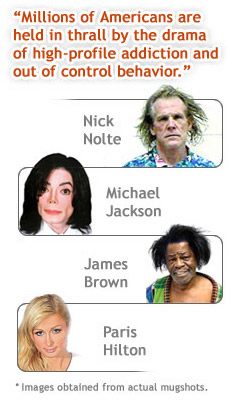 Maybe it seems like celebrities are getting into trouble more often these days. Maybe it’s just always been this way. Why do we care? Why do we spend an astonishing amount of time and money following their troubles? From magazines to the tabloids to network and cable TV, the cult of celebrity is an enormous business today. On the Web, for instance, roughly 200 tabloid sites follow the daily buzz on easy celebrity targets, reporting on everything from Lindsay Lohan’s rehab to Britney Spears’ latest drug test/child custody fight/run-in with paparazzi/insert calamity to Owen Wilson’s suicide attempt.
 Millions of Americans are held in thrall by the drama of high-profile addiction, out of control behavior, and mental health breakdowns. Do we seek something about ourselves in the problems of the famous? Is this some kind of societal sickness? Have we all gone off the deep end?
According to many who study the phenomenon of celebrity fascination -- psychologists, sociologists, anthropologists -- we’re instinctively drawn to celebrity: Familiar faces are friends. Who could be more familiar and friendly than Jennifer Aniston? We like her. We care about her. She’s one of our tribe, or so some of us believe.
Humans are predisposed to worship something, be it divine or human, according to the psychologist James Houran, PhD, director of 20|20 Skills, an employee assessment firm, and co-creator of the Celebrity Attitude Scale, a tool for measuring a person’s interest in celebrities. In fact, studies reveal an interesting relationship in this case -- churchgoing people are somewhat less fascinated with celebrity than non-religious people.
A certain level of celebrity worship is normal and natural, especially in Western societies, Houran says. "Fans get a rush from feeling connected to celebrities, and seeing celebrities in compromising situations helps us relate to them and feel better about our own shortcomings."
 But today’s high-stakes gossip industry isn’t exactly normal behavior. Is the dirt-dishing business following some sort of public mania -- or does it play a role in creating and fueling the mania?
Houran suspects that the constant barrage of celebrity information provides a sort of continuous instant fix that "probably reinforces and deepens the ‘addiction’ people have to celebrities."
If, as it seems, we’re addicted to celebrity addictions, at what point does fascination cross the line? "It’s a sign of unhealthy celebrity worship when our own personal lives are affected by the personal lives of celebrities with whom we have no relation," Houran says. "Deep psychological drives are at work in these circumstances. Extreme celebrity worshipers feel disconnected from family and friends, and they show more anxiety, depression, poor body image, and deficits in critical thinking. It seems these people seek a sense of identity and purpose by latching onto celebrities who, in part, possess qualities or a lifestyle they want. Watching celebrities has psychological and biological reactions similar to taking certain drugs, so we’re dealing with a form of addiction here."
Another effect of the constant scrutiny of so many celebrities -- many of whom have little or no specific talent, but are simply manufactured in a stew of PR and infotainment -- is that celebrities across the board are diminished. "I think this is one reason why celebrities are doing more outrageous publicity stunts," Houran says.
Those stunts seem to bring out the worst, or at least the most passionate, in us. Note the blog comments that follow any of the latest Britney/Lindsey/Paris foul-ups. "Jeering and scorn are absolutely a part of celebrity worship," says Houran, "and the public has love-hate reactions to many celebrities. People take delight in watching celebrities fall from grace -- especially those who seem to ‘deserve it.’"
We’re in the "Kleenex phase" of fame, says Leo Braudy, PhD, professor of English at the University of Southern California, expert on popular culture, and author of The Frenzy of Renown. He noted in Psychology Today that: "We see so much of people, and in all branches of the media. We blow our nose on every new star that happens to come along, and then dispose of them."
We often believe celebrities should be admired and emulated. But celebrities are human. When we see drug addiction, alcoholism, or some other scandal, we realize they can have serious problems. When they head down unhealthy paths, come unglued and fail and wander off to rehab, we’re both disturbed and riveted -- because the illusion is pulled off, and we see the pitfalls and challenges of being human.
|